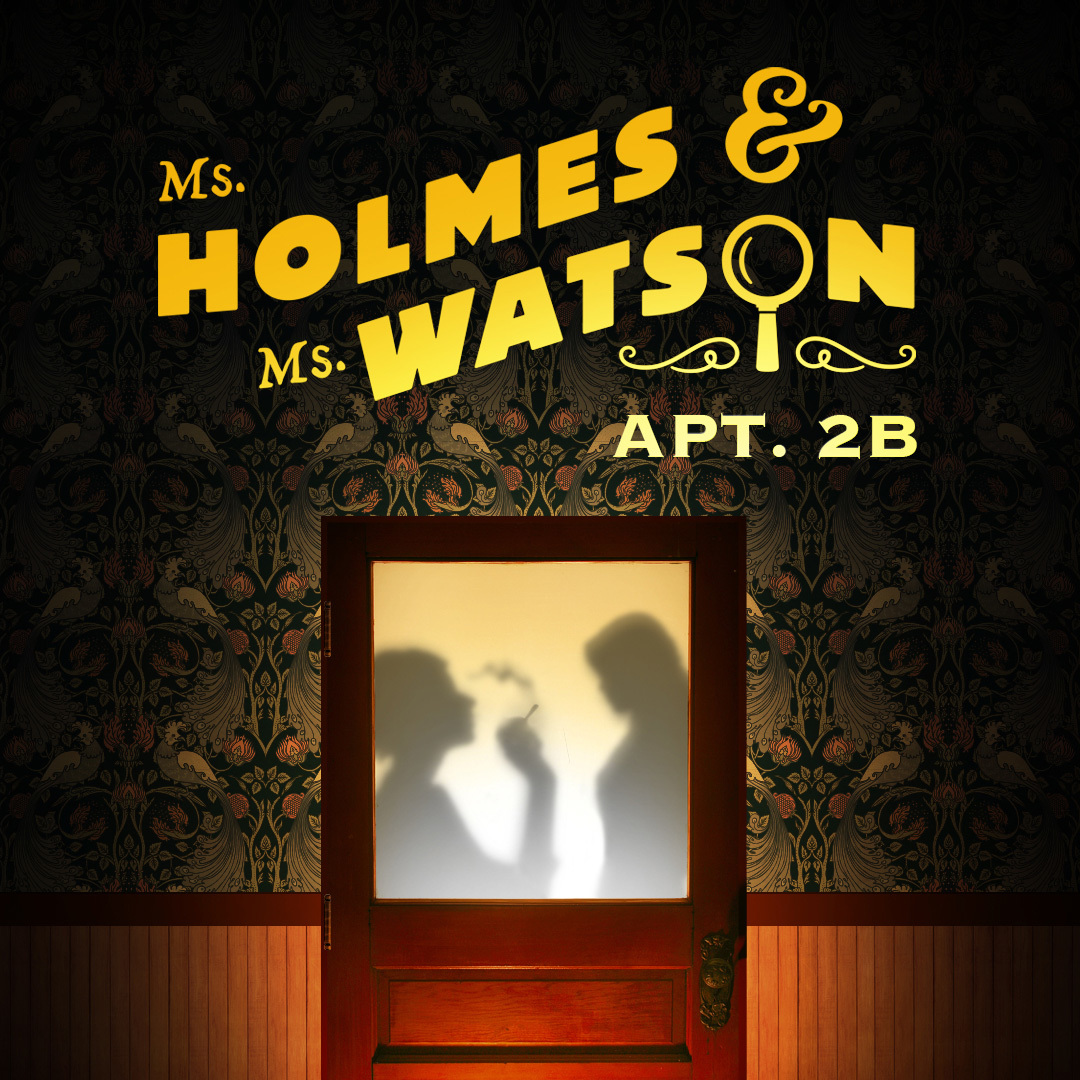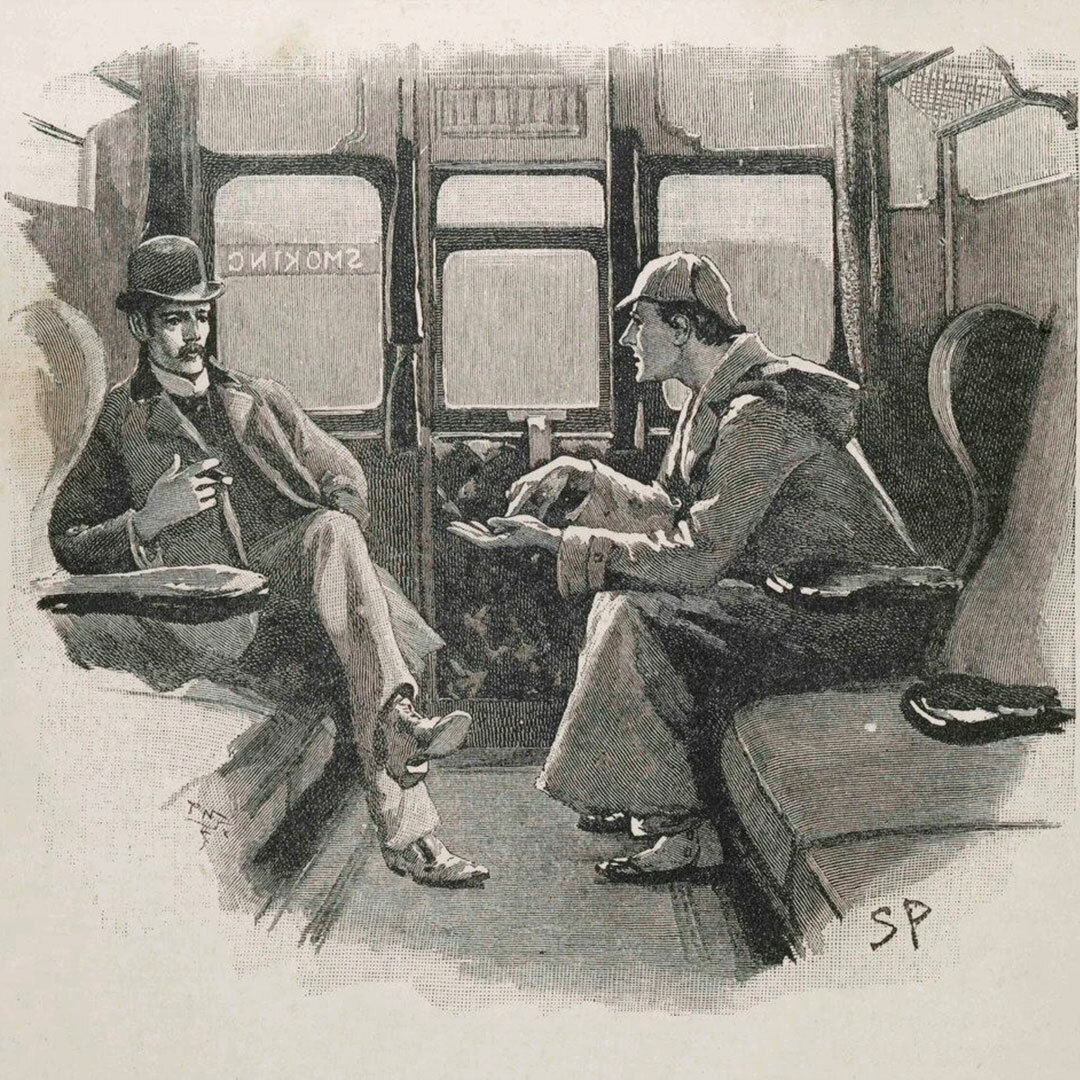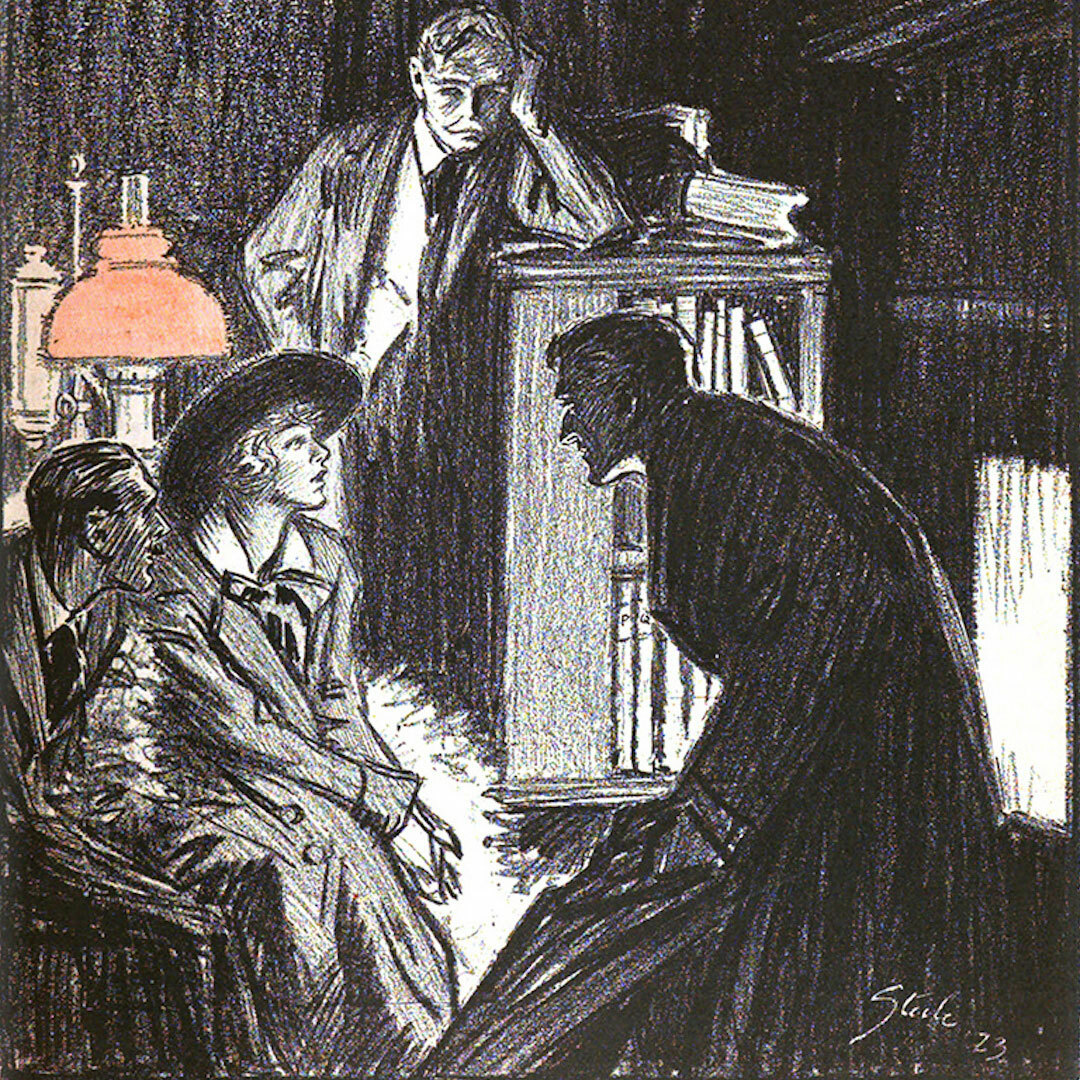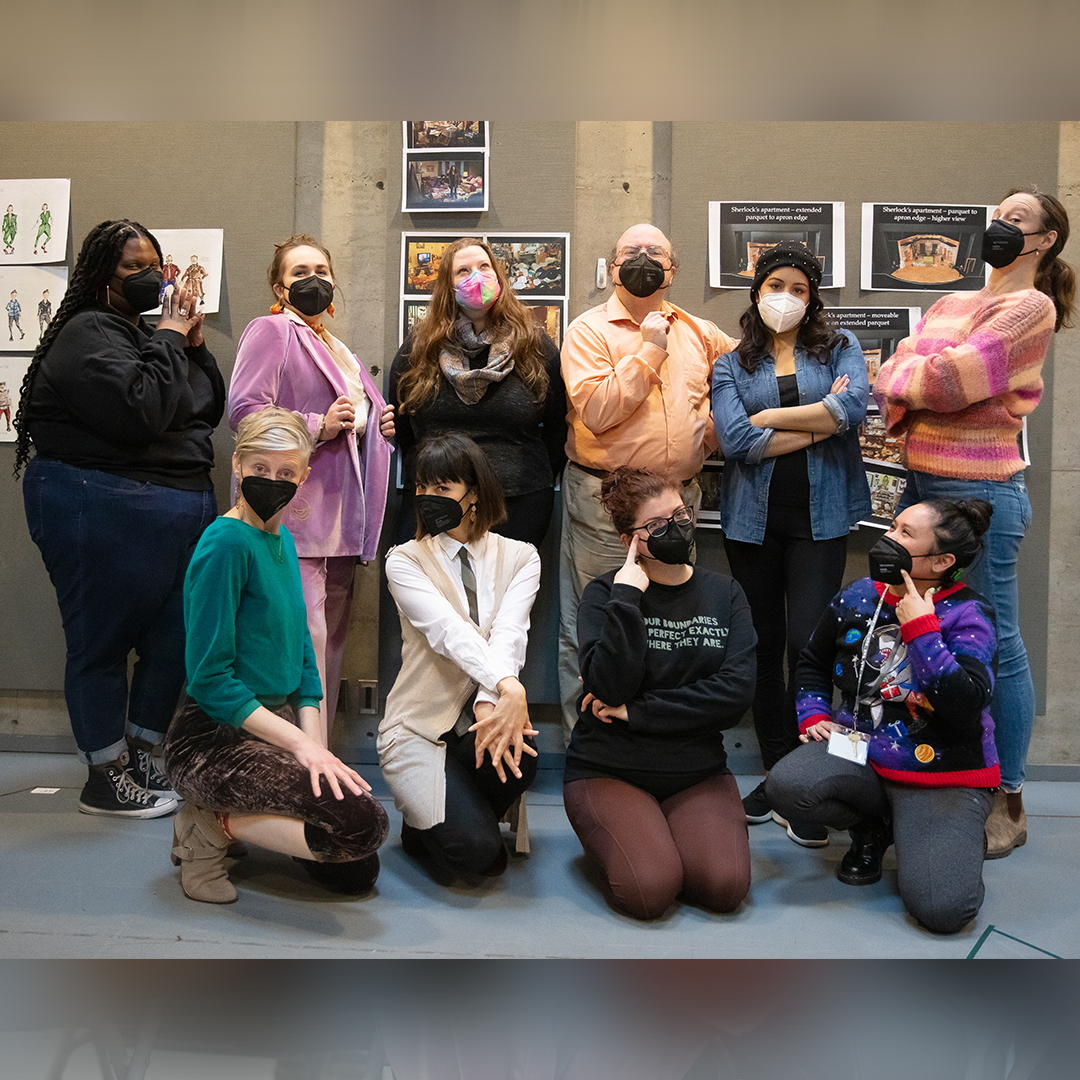Resource Guide
Ms. Holmes & Ms. Watson – Apt. 2B Plot Summary
Spoiler alert! A brief overview of Ms. Holmes & Ms. Watson – Apt. 2B.
Learn More136 Years of Holmes & Watson
With his groundbreaking fictional crime-fighting duo, Sir Arthur Conan Doyle created what many consider to be the first modern “fandom.” Holmes and Watson are the most adapted characters in British literature — with thousands of pastiches across all manner of media.
Learn MoreList of Sherlock Holmes Stories Referenced in Ms. Holmes and Ms. Watson – Apt. 2B
This is a list of some of the Sherlock Holmes stories referenced in the show, but there are plenty more to watch out for. See if you can find the connections and other books mentioned in this play!
Learn MoreMs. Holmes & Ms. Watson – Apt. 2B Reading List
Calling all readers! Multnomah County Library put together a reading list inspired by our production of Ms. Holmes & Ms. Watson – Apt. 2B.
Learn MoreCast & Creative Team
Meet the cast and creative team for Ms. Holmes & Ms. Watson – Apt. 2B.
Learn MoreDISCUSSION QUESTIONS
What are some of the different adaptations of Sherlock Holmes stories that you are familiar with?
How are the stories changed when the genders of certain classic literary characters are changed?
Think of times you had to think outside the box to figure out a solution to a problem or mystery.
ACTIVITY
Surely you can deduce who is coming up the stairs, Watson! The tread, the weight upon each step — even the rhythm of breath!
Materials: A piece of paper and a writing utensil.
Step 1: Group up in pairs and sit directly facing your partner.
Step 2: For 2-5 minutes make as many observations about your partner as possible. Is their jacket wet? Does that mean they were outside recently? What colors are they wearing? Could that be their favorite color? Try your best to make sure none of your observations are rooted in stereotypes or judgments.
Step 3: Take turns sharing your observations with your partner and tracking how many you got correct. The person with the most correct in the classroom wins!
Glossary
“bridegroom bringing me across the threshold”: An ancient Roman practice which may have several origins – one being that a bride would have to be dragged/carried away from their father’s home into their husband’s, another being the belief that evil spirits/curses lingered in the thresholds of newlywed couples in an attempt to doom the marriage so the bride would be carried by her groom to avoid possession. Now, it is just a seemingly romantic gesture.
“A touch, a touch, I do confess”: A line from Shakespeare’s Hamlet in Act IV, Scene II, in which Hamlet and Laertes duel with Laertes’ poisoned blade, which he is ultimately killed by.
“Alexander wept, for there were no more worlds to conquer”: This line is spoken by the villain Hans Gruber in Die Hard. Gruber, played by Alan Rickman, is actually referencing the Greek philosopher, Plutarch, who actually said something akin to “Alexander wept when he heard Anaxarchus discourse about an infinite number of worlds, and when his friends inquired what ailed him, ‘Is it not worthy of tears,’ he said, ‘that, when the number of worlds is infinite, we [i.e. human beings] have not yet become lords of a single one?'” The quote from Die Hard essentially conveys the feeling of loss one can experience after accomplishing a goal.
Chicken Soup for the Soul: A series of books, usually featuring a collection of short, inspirational stories and motivational essays. The 101 stories in the first book of the series were compiled by motivational speakers Jack Canfield and Mark Victor Hansen in 1993.
“Eliminate the impossible”: This is a popular quote from Sherlock Holmes. Though it appears in many iterations over the stories, the first was in 1890’s The Sign of the Four. The full quote is, “How often have I said to you that when you have eliminated the impossible, whatever remains, however improbable, must be the truth?”
“Engage opponents as they expect; while you wait for the extraordinary moment”: A quote from The Art of War. The full quote reads, “Engage people with what they expect; it is what they are able to discern and confirms their projections. It settles them into predictable patterns of response, occupying their minds while you wait for the extraordinary moment — that which they cannot anticipate.”
“Et tu, Sherlock”: A reference to Act III, Scene 1 of William Shakespeare's Julius Caesar. It translates as "and you, Brutus?" It is spoken by the Roman dictator, Julius Caesar, at the moment of his assassination, to his friend Marcus Junius Brutus, upon recognizing him as one of the assassins.
“Faith and begorrah”: Begorrah is a euphemism for the phrase “by God.” You sometimes hear it in the phrase “faith and begorrah.” It's the Irish equivalent of an American saying, “by golly” or “by gosh.”
“Help me Sherlock Holmes-Kenobi”: "Help me, Obi-Wan Kenobi. You're My Only Hope!" is a memorable quote uttered by the character Princess Leia in the 1977 science fiction film Star Wars: Episode IV – A New Hope.
“No man is an island”: A much-remembered line from 17th-century poet John Donne’s 1623 writings “Meditation 17.” The complete stanza reads as follows, “No man is an island/entire of itself;/every man is a piece of the continent,/a part of the main./If a clod be washed away by the sea,/Europe is the less,/as well as if a promontory were./as well as if a/manor of thy friend’s/or of thine own were./Any man’s death diminishes me,/because I am involved in mankind;/and therefore never send to know for/whom the bell tolls;/it tolls for thee.”
“Preparation may lie within our joined hands”: An approximation of a quote from Sun Tzu’s The Art of War. The full quote is, “The opportunity to secure ourselves against defeat lies in our own hands, but the opportunity of defeating the enemy is provided by the enemy himself.”
“Rache”: You’ll be happy to know that all the explanations for the possible meaning of rache – German for revenge [pronounced approximately like rah-cuh], a hunting dog, and indeed the beginning of the name Rachel – are all exactly correct! Kate’s so smart. This part of the mystery is lifted directly from Doyle’s A Study in Scarlet.
“Shall not pass”: "They shall not pass" (French: Ils ne passeront pas) is a slogan, most notably used by France in World War I, to express a determination to defend a position against an enemy. In the film version of The Lord of the Rings: The Fellowship of the Ring Gandalf’s iconic line is delivered “You shall not pass” as he defends the gang against Balrog. In the novel, however, he says “you cannot pass.”
“That is the mercy that droppeth”: "The quality of mercy" is a speech given by Portia in William Shakespeare's The Merchant of Venice (Act IV, Scene 1). Portia, disguised as a lawyer, begs Shylock to show mercy to Antonio. The speech extols the power of mercy, "an attribute to God Himself."
“The play's the thing”: A line uttered by Hamlet in Act II, Scene 2, where he plans to catch his uncle by putting on a play.
“The spirit I have seen may be the devil”: Another quote from Hamlet.
“There is a scarlet thread of chaos”: This is an (indirect) quote from Doyle’s first Sherlock Holmes novel, A Study in Scarlet. It ends Chapter 4, when Holmes says to Watson, “There's the scarlet thread of murder running through the colourless skein of life, and our duty is to unravel it, and isolate it, and expose every inch of it.”
“To be, or not to be”: The opening phrase of a soliloquy given by Hamlet in the so-called "nunnery scene," Act III, Scene 1.
“What’s in the boxxxx?”: An iconic line from the 1995 film Seven starring Brad Pitt and Morgan Freeman. This movie follows disenchanted, near-retirement detective William Somerset (Freeman) and his new partner, David Mills (Pitt), as they attempt to stop a serial killer before he can complete a series of murders based on the seven deadly sins. (Spoilers ahead) The line comes from the film’s final scene where Pitt’s character discovers that the killer has decapitated his pregnant wife and has put her head in a box.
#StudyInScarlet: A nod to Doyle’s first Holmes novel “A Study in Scarlet” where we find the Drebber character, the “rache” misdirection, a killer uncovered by a ring, and a cabbie involved in the crime.
15 stone: A stone is a unit of weight equal to 14 pounds. Mr. Drebber is 210 pounds.
A control: When conducting an experiment, a control is an element that remains unchanged or unaffected by other variables – for example, a placebo.
Advance: The “advance” is the basic forward movement in fencing. The front foot moves first, beginning by lifting the toes. Straighten the leg at the knee, pushing the heel out in front. Land on the heel, and then bring the back foot up to an “en garde” stance, which is a defensive position that translates to “on guard.”
“Adventure of the Golden Monkey”: There is no Golden Monkey story in Holmes’ canon but it could refer to The Adventure of the Creeping Man, which features monkeys, or The Adventure of the Golden Pince Nez.
Alexander the Great: A king of the ancient Greek kingdom of Macedon. By the age of thirty, he had created one of the largest empires in history, stretching from Greece to northwestern India. He was undefeated in battle and is widely considered to be one of history's greatest and most successful military commanders.
America Ferrera: A Honduran-American actress born in 1984. She made her feature film debut in 2002 with Real Women Have Curves, earning praise for her performance. Ferrera has won many awards, including an Emmy, a Golden Globe, and a Screen Actors Guild Award, among others.
Anarchist: Anarchy is a society without a government. It may also refer to a society or group of people that entirely reject a set hierarchy. Anarchy was first used in English in 1539, meaning "an absence of government."
Angela’s Ashes: A 1996 memoir by the Irish-American author Frank McCourt, with various anecdotes and stories of his childhood. The book details his very early childhood in Brooklyn, New York, but focuses primarily on his life in Limerick, Ireland. It also includes his struggles with poverty and his father's alcoholism. The book won the 1997 Pulitzer Prize for Biography or Autobiography.
Angry 11’s: Frown lines or the two vertical lines that form between the eyebrows.
Anton Chekov: A Russian doctor, playwright, and short story writer who lived from 1860-1904. Known for plays like The Seagull and The Cherry Orchard, he is considered one of the major influences of naturalism and modernism in the theatrical canon.
Arsenic: A chemical known for its use as a poison. The immediate symptoms of acute arsenic poisoning include vomiting, abdominal pain, and diarrhea. These are followed by numbness and tingling of the extremities, muscle cramping, and death in extreme cases.
BBC One: A British free-to-air public broadcast television network owned and operated by the BBC. It is the corporation's flagship network and is known for broadcasting mainstream programming, which includes BBC News television bulletins, primetime drama and entertainment, and live sports events.
Black Widow: May refer to the character Natasha Romanova from Marvel comics and the Marvel Cinematic Universe. Black Widow is a Russian agent trained as a spy, martial artist, and sniper, and outfitted with an arsenal of high-tech weaponry, including a pair of wrist-mounted energy weapons dubbed her "Widow's Bite."
Blarney Stone: A block of limestone built into the battlements of Blarney Castle, Blarney. According to legend, kissing the stone endows the kisser with the gift of the gab (great eloquence or skill at flattery).
Blue nails: This is a reference to a condition known as cyanosis. It occurs when there isn’t enough oxygen in your blood, making the skin or membrane below the skin turn a purplish-blue color.
Blue screen: An error screen that the Windows operating system displays in the event of a fatal system error. It indicates a system crash, in which the operating system has reached a critical condition where it can no longer operate safely.
Bristol: A city in England that is situated on the River Avon. It is bordered by the counties of Gloucestershire to the north and Somerset to the south. About an hour and a half train ride from London.
British Police and Guns: In all of the UK (except Northern Ireland), only specialized members of the police force are armed with guns. The vast majority of officers are instead issued with other items for personal defense, such as speed cuffs, extendable "ASP" batons, and incapacitant sprays such as PAVA or CS spray.
Bubbelah: A Yiddish term of endearment translating to sweetie or darling.
Case of the Dancing Men: A Sherlock Holmes story originally titled The Adventure of the Dancing Men written by Sir Arthur Conan Doyle. This is one of 13 stories in the cycle published as The Return of Sherlock Holmes in 1905. It was first published in The Strand Magazine in the United Kingdom in December 1903.
Chairman Mao: A Chinese communist revolutionary who was the founding father of the People's Republic of China, which he ruled as the chairman of the Chinese Communist Party from the establishment of the PRC in 1949 until his death in 1976. Ideologically a Marxist–Leninist, his theories, military strategies, and political policies are collectively known as Maoism.
Chasing bloodhounds: Bloodhounds are often used by detectives because of their powerful sense of smell. Researchers estimate that their sense of smell is at least 1,000 times stronger than a human's and they can follow a scent trail that is up to 300 hours old.
Chutzpah: A Yiddish word meaning impudence or gall, but has come to generally mean boldness or courage.
Cold War: A period of geopolitical tension between the United States and the Soviet Union and their respective allies that lasted from approximately 1945-1991, with the failed coup and the dissolution of the USSR. The term “Cold War” is used because there was no large-scale fighting directly between the two superpowers, but they each supported major regional conflicts known as proxy wars.
Commies: A derogatory term for communists. Communism is a far-left socio-political ideology whose goal is the establishment of a communist society, a socioeconomic order centered around common ownership of the means of production, distribution, and exchange, which allocates products to everyone in the society. Communist society also involves the absence of private property, social classes, money, and the state.
Confucian: A philosophical system named after the teachings of the Chinese philosopher Confucius which regards "the secular as sacred." Confucianism transcends the dichotomy between religion and humanism, considering the ordinary activities of human life — and especially human relationships — as a manifestation of the sacred, because they are the expression of humanity's moral nature.
Crescendo: The loudest point reached in a gradually increasing sound.
Curio shop: A souvenir shop that sells curios (rare, unusual, or intriguing objects) and other novelty items.
“Danny Boy”: A ballad, written by English songwriter Frederic Weatherly in 1913, and set to the traditional Irish melody of "Londonderry Air".
Die Hard: A 1988 movie starring Bruce Willis and Alan Rickman. Willis plays New York City police detective John McClane, who is caught up in a terrorist takeover of a Los Angeles skyscraper while visiting his estranged wife. It is the first film in a franchise of five films, the last of which was released in 2013.
Dr. Frankenstein: A fictional character and the main protagonist and title character in Mary Shelley's 1818 novel, Frankenstein; or, The Modern Prometheus. He is an Italian-Swiss scientist who, after studying chemical processes and the decay of living things, gains an insight into the creation of life and gives life to his own creature.
Eat, Pray, Love: A 2010 film starring Julia Roberts, based on Elizabeth Gilbert’s memoir, where she recounts her post-divorce trip to Italy, India, and Bali, which becomes a journey of self-discovery.
Ecco un artiste!: (What an actor/artist) This is the line Tosca utters when she watches what she thinks is Cavaradossi’s fake execution — proud of her lover's performance, not knowing that he is actually dead.
Elliot Monk: Named in reference to billionaire Elon Musk, CEO of SpaceX, Tesla, and now Twitter. He has a reported network of $164 billion.
Emma Goldman: A Russian-born anarchist, political activist, and writer who lived from 1869-1940. She played a pivotal role in the development of anarchist political philosophy in North America and Europe in the first half of the 20th century. Her writing and lectures spanned a wide variety of issues, including prisons, atheism, freedom of speech, militarism, capitalism, marriage, free love, and homosexuality.
En Garde: (On guard) A call to a fencer to adopt a defensive stance in readiness for an attack or bout.
Encyclopedia Brown: A series of 29 books by Donold Sobol featuring the adventures of boy detective Leroy Brown, nicknamed "Encyclopedia" for his intelligence and range of knowledge. The first book was published in 1963, and the last published posthumously in 2012.
Erin Go Bragh: The anglicisation of an Irish language phrase, Éirinn go Brách, and is used to express allegiance to Ireland. It is most often translated as "Ireland Forever”.
Fencing mask: Fencing masks include a metal net and bib made of resistant fabric. There are different styles of masks based on the sword with which a fencer is fighting.
Film noir: A cinematic term used primarily to describe stylish Hollywood crime dramas, particularly those that emphasize cynical attitudes and motivations. The 1940s and 1950s are generally regarded as the "classic period" of American film noir. Film noir of this era is associated with a low-key, black-and-white visual style that has roots in German Expressionist cinematography. Many of the prototypical stories, and much of the attitude of classic noir derive from the hardboiled school of crime fiction that emerged in the United States during the Great Depression. An example would be “The Big Sleep” or more modern films like Brad Pitt’s “Bullet Train”.
Finalmente: Finally, or, at long last.
Foil: One of the three weapons used in the sport of fencing, all of which are metal. It is flexible, rectangular in cross section, and weighs under a pound.
Free Workers Union: Or, Freie Arbeiterinnen- und Arbeiter-Union in German, was an anarcho-syndicalist trade union in Germany. It stemmed from the Free Association of German Trade Unions (FDVG) which combined with the Ruhr region's Freie Arbeiter Union on September 15, 1919. The FAUD was involved in the revolution in Germany from 1918 to 1923, and continued to be involved in the German labor movement after the FAUD began to decline in 1923.
Hamlet: The Tragedy of Hamlet, Prince of Denmark, is a tragedy written by William Shakespeare sometime between 1599 and 1601. Set in Denmark, the play depicts Prince Hamlet and his attempts to exact revenge against his uncle, Claudius, who has murdered Hamlet's father in order to seize his throne and marry Hamlet's mother.
Handel’s Messiah: English-language oratorio composed in 1741 by George Frideric Handel. The text was compiled from the King James Bible and the Coverdale Psalter by Charles Jennens. It was first performed in Dublin on April 13th, 1742 and is most known for its Hallelujah Chorus.
“Harriet the Spy”: A 1964 children’s novel by Louise Fitzhugh which follows 11 year old Harriet M. Welsch, an aspiring writer who lives in New York City's Upper East Side. She carries around a notebook in which she writes down detailed observations of her neighbors and peers. After her notebook is discovered, she is tortured by classmates who call themselves “The Spy Catchers Club”. Eventually, Harriet becomes the editor of the school newspaper and starts a column of stories based on her notebook observations.
Honeypot operation: A term for an operational practice involving the use of a covert agent (usually female), to create a sexual or romantic relationship to compromise a (usually male) target.
Iconoclast: A person who attacks cherished beliefs or institutions.
il culmine: Italian for “summit” or “the top”.
Julia Roberts: A famous American actress born in 1967, she is known for films like Pretty Woman and Runaway Bride. The films in which she has starred have collectively grossed over $3.9 billion globally, making her one of Hollywood's most bankable stars.
Kenyon Junction Station: A closed railway station in Culcheth, Warrington England that is about a three hour train ride from London. According to disused-stations.org, “The station stood in a derelict state for some years after closure [in 1954] but certainly by the 1970s it had been completely demolished and today there is nothing much to show it ever existed. The wide track bed which would have accommodated the extensive sidings can still be seen and the busy Liverpool to Manchester line is still very active serving numerous goods and passenger services.”
Laverne & Shirley: An American sitcom television series that played for eight seasons on ABC from 1976 to 1983. A spin-off of Happy Days, Laverne & Shirley starred Penny Marshall and Cindy Williams as Laverne DeFazio and Shirley Feeney, two friends and roommates who work as bottle-cappers in the fictitious Shotz Brewery in late 1950s Milwaukee, Wisconsin. Laverne & Shirley became the most-watched American television program by its third season; in total, it received six Golden Globe nominations and one Emmy nomination.
Lucky Charms: A brand of breakfast cereal produced by General Mills since 1964. The cereal consists of multi-colored marshmallows and pieces of shaped pulverized oat, each resembling one of several objects or symbols associated with good luck. The packaging and marketing features a leprechaun mascot, Lucky.
Lucre: Money, especially when regarded as sordid or distasteful, or gained in a dishonorable way.
Margaret Thatcher: A past prime minister of the United Kingdom from 1979 to 1990, and Leader of the Conservative Party from 1975 to 1990. She was the first female British prime minister and the longest-serving British prime minister of the 20th century. As prime minister, she implemented economic policies that became known as “Thatcherism” which promoted expansionary capitalism. A Soviet journalist dubbed her the "Iron Lady", a nickname that became associated with her uncompromising politics and leadership style.
Marxists: Left-wing to far-left method of socioeconomic analysis that uses a materialist interpretation of historical development. Marxists view capitalism as economically unsustainable and incapable of improving the population's living standards due to its need to compensate for the falling rate of profit by cutting employees' wages and social benefits while pursuing military aggression. The socialist mode of production would succeed capitalism as humanity's mode of production through revolution by workers. According to Marxian crisis theory, socialism is not an inevitability but an economic necessity.
Meryl Streep: An American actress born Mary Louise in 1949. She has received numerous 21 Academy Award nominations, winning three, and 32 Golden Globe Award nominations, winning eight. She has also received two British Academy Film Awards, two Screen Actors Guild Awards, and three Primetime Emmy Awards, in addition to nominations for a Tony Award and six Grammy Awards.
Michaelangelo: An Italian sculptor, painter, architect, and poet of the High Renaissance. He is most known for his sculpture David and for painting the ceiling of the Sistine Chapel. It is believed that he dissected human cadavers so as to better understand how to paint and sculpt human anatomy.
Mother Superior: The female superior of a community of Catholic nuns in an abbey. She must be at least 40 years old, have been a nun for 10 years, and has many responsibilities such as receiving the vows of the nuns of the abbey and sending nuns on their various assignments.
Mrs. Warren’s Profession: The phrase is used to describe sex workers and comes from the title of a 1902 play by George Bernard Shaw, which follows a madam who tries to reconcile with her estranged daughter who disapproves of her mother’s work.
Nancy Drew: A fictional character appearing in several mystery book series, movies, and a TV show as a teenage amateur sleuth. The books are ghostwritten by a number of authors and published under the collective pseudonym Carolyn Keene. Created by the publisher Edward Stratemeyer as the female counterpart to his Hardy Boys series, the character first appeared in 1930 in the Nancy Drew Mystery Stories series, which lasted until 2003 and consisted of 175 novels.
Nimbus: A luminous cloud or a halo surrounding a supernatural being or a saint.
“O Dolce Mani”: An aria from Puccini’s opera Tosca sung by the character Cavaradossi to his lover Floria Tosca. The lyrics translate to “My Saviour!/ Oh sweet hands pure and gentle,/Oh hands meant for the fair works of piety,/Caressing children, gathering roses,/For prayers when others meet misfortune …/Then it was in you, made strong by love,/That justice placed her sacred weapons?/You dealt out death, victorious hands,/Oh sweet hand pure and gentle.”
Parlor trick: A simple trick or demonstration that is used to entertain or amuse guests.
Parry: A simple defensive action designed to deflect an attack, performed with the forte of the blade. A parry is usually only wide enough to allow the attacker's blade to just miss.
Patek Philippe 480 Chronograph: While it seems this particular watch doesn’t actually exist, the Patek Philippe watchmaker company is one of the most expensive in the world. In fact, the most expensive watch ever sold was the Patek Grandmaster Chime Ref. 6300A-010 which cost $31.19 million.
“Penderecki Capriccio”: Capriccio for Violin and Orchestra is a 1967 composition by Polish composer Krzysztof Penderecki.
Perverts in pizza parlors: A conspiracy theory emerging during the 2016 election after the breach of Hillary Clinton’s emails. Proponents of the Pizzagate conspiracy theory falsely claimed the emails contained coded messages that connected several high-ranking Democratic Party officials and U.S. restaurants with an alleged human trafficking and child sex ring. One of the establishments allegedly involved was the Comet Ping Pong pizzeria in Washington, D.C.
Picasso: A Spanish painter, sculptor, printmaker, ceramicist, and theater designer. He is known for co-founding the Cubist movement, the invention of constructed sculpture, and the co-invention of collage. Picasso has been commonly characterized as a womanizer and a misogynist, being quoted as having said to one of his mistresses, Françoise Gilot, "Women are machines for suffering."
Pinko: A pejorative coined in 1925 in the United States to describe a person regarded as being sympathetic to communism, though not necessarily a Communist Party member. One is not a Red, but rather a pink.
Poncy: Pretentious or affected.
Post-Soviet: Refers to the period of time following the 1991 fall of the Union of Soviet Socialist Republics, which resulted in the creation of 15 new governments/countries and a severe drop in economic and social conditions in post-Soviet states.
Pseudonymous: Writing or written under a false name.
Pulsometer: An individual monitoring and measuring device with the ability to measure heart or pulse rate.
“Put on a Happy Face”: A song from the 1960 musical Bye Bye Birdie, notably sung by Dick Van Dyke.
Qu’est que c’est: A French idiom that roughly translates to “what is that?” but can be used to express disbelief or incredulity.
Quotidian: Of or occurring every day; daily.
Rachmaninoff: A Russian aristocrat and composer who lived from 1873-1943. His most famous work is “Piano Concerto No. 2 in C minor.”
Red menace: An anti-communist term which is the promotion of a widespread fear of a potential rise of communism, anarchism, or other leftist ideologies by a society or state.
Riposte: An attack made immediately after a parry of the opponent's attack.
Sacco & Vanzetti: Italian immigrant anarchists who were controversially accused of murdering Alessandro Berardelli and Frederick Parmenter, a guard and paymaster respectively, during the April 15, 1920, armed robbery of the Slater and Morrill Shoe Company in Braintree, Massachusetts, United States. Seven years later, they were executed in the electric chair at Charlestown State Prison. Their trial was marked with controversy and many believe they were innocent and the victims of anti-Italian and anti-immigrant discrimination leading to their conviction.
Sally Kimball: A fictional character in the Encyclopedia Brown book series. She is Encyclopedia Brown's bodyguard, sidekick, best friend, and detective agency business partner.
Salute: Prior to starting a bout, the fencers must salute each other. Refusal to do so can result in a fencer's suspension or disqualification. Both fencers must salute each other and the referee. They may choose to salute the audience. In non-electric events the four judges should also be saluted.
Scotland Yard: The headquarters of the Metropolitan Police, the territorial police force responsible for policing the 32 boroughs of London. Its name derives from the location of the original Metropolitan Police headquarters at 4 Whitehall Place, which also had an entrance on a street called Great Scotland Yard.
Seven pressure points: There is little evidence to suggest that any pressure point could actually lead to death, but there are indeed health benefits to pressure points as employed by practitioners of acupuncture and massage.
Shamrock: A young sprig, used as a symbol of Ireland. Saint Patrick, Ireland's patron saint, is said to have used it as a metaphor for the Christian Holy Trinity.
“Shostakovich 10, Movement 2”: The second of four movements in Russian composer Dmitri Shostakovich’s Symphony No. 10 in E Minor. Living from 1906 - 1975, he was one of Soviet Russia’s most famous composers. It is said that Symphony No. 10 is meant to comment on Soviet society and the second movement (Allegro) is a depiction of Joseph Stalin.
Siberia: A region of Russia with a particularly harsh winter climate. During the Soviet era, it was home to many labor and prison camps.
Sister Act 2: A 1993 American musical comedy film – the sequel to the 1992 film Sister Act, loosely based on the life of Crenshaw High School choir instructor Iris Stevenson. The story sees Whoopi Goldberg reprising her role as Deloris van Cartier, as she finds herself coming to the aid of her nun friends who need her help to save her old school.
Sisterhood of the Traveling Pants: A 2005 American comedy-drama film based on the 2001 novel of the same name by Ann Brashares. The film stars America Ferrera, Amber Tamblyn, Blake Lively, and Alexis Bledel. The story follows four best friends who buy a mysterious pair of pants that fits each of them despite their differing sizes. The girls share the pants equally as they spend their first summer apart.
Socialism: A political and economic theory of social organization that advocates that the means of production, distribution, and exchange should be owned or regulated by the community as a whole.
Sopranos: A television show which aired for 6 seasons between 1999-2007. The story revolves around Tony Soprano (James Gandolfini), a New Jersey-based Italian-American mobster, portraying his difficulties as he tries to balance family life with his role as leader of a criminal organization. These are explored during his therapy sessions with psychiatrist Jennifer Melfi. (Spoilers ahead) In season 4, episode 9 “Whoever Did This” Tony strangles one of his associates and dismembers him in a bathtub with a meat cleaver.
“Spy vs. Spy”: A wordless comic strip published in Mad magazine. It features two agents involved in stereotypical and comical espionage activities. The pair are always at war with each other, using a variety of booby traps to inflict harm on the other.
Squatters rights: Occupying an abandoned or unoccupied area of land or a building, usually residential, that the squatter does not own, rent, or otherwise have lawful permission to use. In London, someone can become the legal owner of a property after 10 years.
Star Spangled Banner: The national anthem of the United States. The lyrics come from the "Defence of Fort M'Henry," a poem written in 1814 by Francis Scott Key after witnessing the bombardment of Fort McHenry by British ships of the Royal Navy. The poem was set to the tune of a popular British song written by John Stafford Smith for the Anacreontic Society, a men's social club in London, "To Anacreon in Heaven."
Star Wars: A space epic created by George Lucas in 1977. There have been nine films and several television shows in this universe.
Steampunk: A subgenre of science fiction that incorporates retro-futuristic technology and aesthetics inspired by 19th-century industrial steam-powered machinery.
Stethoscope: Medical device for auscultation, or listening to internal sounds of an animal or human body.
Sun Tzu: A Chinese military general, strategist, philosopher, and writer who lived between 544 and 496 BC.
Thames: A river that flows through southern England including London. At 215 miles, it is the longest river entirely in England and the second-longest in the United Kingdom, after the River Severn.
“The Adventure of the Blue Goose”: Likely refers to The Adventure of the Blue Carbuncle, which was published in 1892.
“The Adventure of the Sussex Vampire”: One of the short stories written by Sir Arthur Conan Doyle featuring Sherlock Holmes, published in 1924 and amassed in The Case-Book of Sherlock Holmes.
“The Art of War”: An ancient Chinese military treatise dating from the Late Spring and Autumn Period (roughly 5th century BC). The work, which is attributed to the ancient Chinese military strategist Sun Tzu, is composed of 13 chapters. Each one is devoted to a different set of skills or art related to warfare and how it applies to military strategy and tactics.
The Case of the Creeping Man: One of the short stories written by Sir Arthur Conan Doyle and published in 1923, featuring Sherlock Holmes and amassed in The Case-Book of Sherlock Holmes. It was originally titled The Adventure of the Creeping Man.
The Case of the Devil’s Foot: The Adventure of the Devil's Foot from 1910 is one of the 56 Sherlock Holmes short stories written by Arthur Conan Doyle. It is one of eight stories in the cycle collected as His Last Bow. Doyle ranked it 9th of his favorite Sherlock Holmes stories.
The Case of the Speckled Band: One of 56 short Sherlock Holmes stories written by Sir Arthur Conan Doyle, the eighth story of twelve in the collection The Adventures of Sherlock Holmes. It was originally published in the Strand Magazine in February 1892.
The Consumption of Lady Carfax’s Corpse: Originally titled The Disappearance of Lady Frances Carfax, it is one of the short stories written by Sir Arthur Conan Doyle and published in 1911 featuring Sherlock Holmes. It is part of the 1917 collection of stories His Last Bow.
The Fuzz: A slang term for the police. There are many origin stories including it being a deliberate mispronunciation of “The Force,” a mocking by hippies of police officers’ short haircuts, and a vulgar term for vagina.
The Guardian: The Guardian is a British daily newspaper. It was founded in 1821 as The Manchester Guardian; it changed its name in 1959.
The Hound of the Baskervilles: One of the four Sherlock Holmes novels published in the Strand from 1901-1902. This was the first appearance of Holmes since his apparent death in The Final Problem, and the book’s success led to the character's eventual revival.
The Red Tide: A belief that if communism/Marxist-Leninism succeeded in one country, it would inevitably take over the world.
Thrust: An attack made by moving the sword parallel to its length and landing with the point.
Timex: A watch company whose products are highly affordable — with prices ranging from roughly $30 to $500 at its most expensive. It is known for the slogan “takes a lickin’ and keeps on tickin'.”
Tom Clancy: An American novelist. He is best known for his technically detailed espionage and military-science storylines set during and after the Cold War. Seventeen of his novels have been bestsellers and more than 100 million copies of his books have been sold. One of his most famous works is The Hunt for Red October.
Top O’ the Mornin’: Possibly connected to a notion of fresh unhomogenized milk, where the desirable cream rises to the top (compare “cream of the crop” and “creme de la creme”), and thus wishing the listener to have an excellent day.
Tosca: A 1900 opera in three acts by Giacomo Puccini. Artist Cavaradossi is painting a portrait of Mary Magdalene in a church that bears a resemblance to a woman named Attavanti who is the sister of his old friend, and political prisoner, Angelotti. Angelotti then appears in the church, having escaped from prison. When Cavaradossi’s lover Floria Tosca arrives, Angelotti hides while the lovers discuss the painting, and Tosca expresses her jealousy over the woman in the painting. Cavaradossi assures her that he is faithful to her and she leaves. Angelotti then tells Cavaradossi of his plans to flee dressed as a woman, but Cavaradossi convinces him to hide out at his cottage and the two men leave the church when it is believed that his escape has been discovered. The chief of police, Scarpia, comes to the church, believing rightly that Cavaradossi has something to do with the prisoner’s escape. There he finds Tosca and convinces her that Cavaradossi is cheating with Attavanti. He has her followed, knowing she will lead them to the fugitives. Cavaradossi is arrested and tortured while Tosca listens. Scarpia says that he will free her lover if she gives up Angelotti and promises to be with him. She agrees but an attendant comes in to report that they nearly caught Angelotti but he killed himself rather than be arrested. Cavaradossi is sentenced to death, but Scarpia plans a mock execution, and when Tosca is left alone with Scarpia, she demands that he provide safe passage away for her and her man. He agrees and while he’s drawing up the papers, Tosca stabs him to death. Tosca then goes to her lover, explaining that she’s negotiated his fake execution and gotten their papers. She teaches him how to fake death during the firing squad and watches as he is fired upon, thinking they are only blanks. She discovers, however, that Scarpia has betrayed her and Cavaradossi has really been killed. She flees capture by the guards and then throws herself from a balcony to her death.
Van Gogh: A Dutch Post-Impressionist painter who posthumously became one of the most famous and influential figures in Western art history. He is most known for paintings like “The Starry Night” and his self-portraits. In 1888, following a fight with his friend and colleague Paul Gauguin, Van Gogh spent the majority of his life battling severe mental illness, which led to his infamous rages.
Victorian: Victorian era, in British history, the period between approximately 1820 and 1914, corresponding roughly, but not exactly, to the period of Queen Victoria's reign.
Vladimir Lenin: A Russian revolutionary, politician, and political theorist. He served as the first and founding head of government of Soviet Russia from 1917 to 1924, and of the Soviet Union from 1922 to 1924. Under his administration, Russia, and later the Soviet Union, became a one-party socialist state governed by the Communist Party. Ideologically a Marxist, his developments to the ideology are called Leninism. Lenin is viewed by his supporters as a champion of socialism and the working class. Meanwhile, Lenin's critics accuse him of establishing a totalitarian dictatorship that oversaw mass killings and political repression.
Vows Column: A New York Times column that has been running for more than 20 years, where couples tell their love stories, often on the occasion of their engagement.
Yankee Doodle: A term that has taken many meanings over the years but originated in the 17th century. It has mostly been used by Europeans to describe Americans – a holdover from a Revolutionary War taunt by British soldiers to colonials. In America, however, it is sometimes a point of pride and used to specifically describe Northerners.
Yonkers: A city in Westchester County, New York. Developed along the Hudson River, it is the third most populous city in the state of New York and is noted for its wealthy citizens.
Thank you to our Education Program Sponsors!
Portland Center Stage is committed to identifying & interrupting instances of racism & all forms of oppression, through the principles of inclusion, diversity, equity, & accessibility (IDEA).













